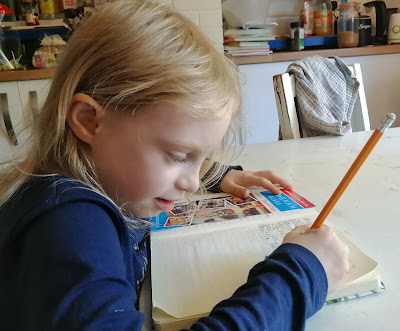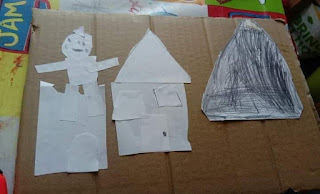Balancing Hospital and Schooling: Part One
There are times currently when my three year old has to spend prelonged periods of time in hospital. This two part blog post covers how we balance moving the learning experience outside the family routine for Xander and how it continues going forward at home for the girls when their regular teacher is gone for days/weeks on end.
We have just faced a prelonged separation within our family, whereby Xander and I were in isolation in hospital for seven weeks, and since then we have had a further two week stay. The easy solution would be to forget about teaching in this situation, he was in grave danger of dying, and enduring chemo and total body radiation. Likewise the girls were dealing with the trauma of losing their mum and brother for a long period of time. However as a family we believed that maintaining normality would be the best way for us all to get through this tough time. He was too young to have the official teaching support which is in place for school aged children, so I teamed up with the play specialist team.
I took favourite family books and toys into the hospital, including a massive duplo set, and kitchen role play toys, new colouring books and art supplies. I had been told that chemo can cause a foggy brain, confusion and temporary memory loss, and I was determined to help Xander as much as possible to prevent or minimise this. I talked with the play specialist team and laid out my vision to help keep him focused. I thought this situation was a perfect opportunity to challenge him out of his comfort zone, learn new skills, and distract him from feeling miserable and giving into sleep to pass the day. We were very successful in this venture and whilst he did nap at least six hours a day due to what he was enduring with the bone marrow transplant, he kept busy the rest of the day.
One of Xanders autistic/ocd issues is dealing with mess/dirt. He does not cope well at all with his environment, fingers or his clothes being dirty, sticky or wet. Consequently he reached almost three years of age and he was still vehemently against paint, glue, playdoh or messy play. I really felt we had the time and the opportunity for a two on one situation where the play specialist and I could approach this with him gently, and just try and introduce him to more messy styles of play.
The play team brought in a massive kitchen set for him which is a role play he loves participating in, and after a week of him serving us food using the plastic food, having got used to the team as well and having built a level of trust, we introduced playdoh. Initially he wanted nothing to do with it and needed his fingers wiped if he accidently touched it, however we kept it within the role play and he warmed to it over the weeks. He now plays with it himself within hospital and home voluntarily, and always asks the play team for it when we have to be readmitted.
Additional sensory play that was introduced to him included putting his favourite dumper truck toys in dried, rice, dried pasta and saving foam, introducing one new messy play a week. We went at his pace and he did come to accept them all to varying degrees. These were only one hit wonders however, he firmly did not want to revisit these activities, and he needed a wipe on hand to regularly clean his hands during playing with them. Paint with sponge roller sticks was the last messy play we introduced to him in the hospital, and he had a great afternoon busily painting away once he got used to the idea of paint on a sponge. His levels of concentration were far lower than with a non messy activity but he wasn't stressed and he did multiple pictures in the session. He once again did not want to repeat this type of session again. However we have had a massive breakthrough at home as a result. During craft time with the girls once we were back, he voluntarily helped himself to their paint sticks and did some beautiful work, and then tried the glue stick for the first time. He placed the glue down, and then I had to place his chosen gem on to the paper for him.
The nurses and doctors were very good interacting with him and would assist in stretching his mind, and they were genuinely surprised at his level of knowledge and understanding. They would say colours and he'd answer them in Japanese, and answer basic addition with them and count to a hundred. He loved playing catch with them as well, along with hide and seek and tag.
Xander was showing improvement in his reading and he was interested, amazing the nursing team by randomly reading the logos off their uniforms. He was however too tired to focus on reading from a book himself, even though he was enjoying listening to me read to him several times a day. I decided to write some words in his colouring book for him to find, some relating with the picture and others just randomly placed. He loved the activity and easily read all the words in my handwriting. He treated it like hide and seek, hunting through the book to find the next magic page.
We are in hospital currently as I write this and a lady has just approached me from a charity called 'Henry Dancer Days' - supporting children with cancer. The pandemic situation prevented them to be able to visit wards whilst we were in during transplant, however now restrictions have been lifted they are beginning to make the rounds. Their job is to come in and give books to the children and to read to them, encouraging their imaginations to be engaged to try and forget the situation they're in for a little while. It is such a lovely idea and if you have children in a similar situation to us or are interested in learning more about it, the website is www.henrydancerdays.co.uk.
It is so hard when you're trying to motivate a sick child whether at home or in a hospital environment to care and focus on education, however it is a battle we need to try and win, for the benefit of their own mental health and learning journey. I hope you all have a great day today, stay safe, and let's continue to work together to give your child the best learning experience possible, no matter what situation we may find ourselves.
Learning gives us all purpose, something to cling on to, a sense of normality, and a chance to escape the current reality for a while. If older children can just keep up activities such as reading, keeping a journal, listening to an audio book, drawing, playing apps, practicing some mental maths, or doing puzzles and words searches, it all helps with their mental acuity, and provides a sense of achievement.






Comments
Post a Comment